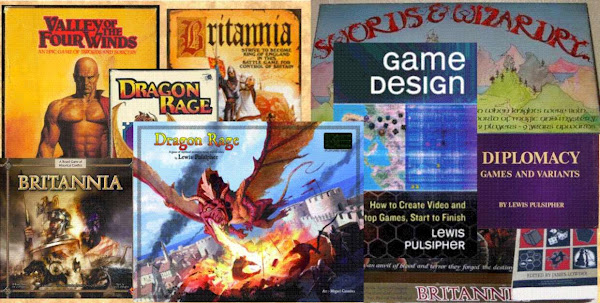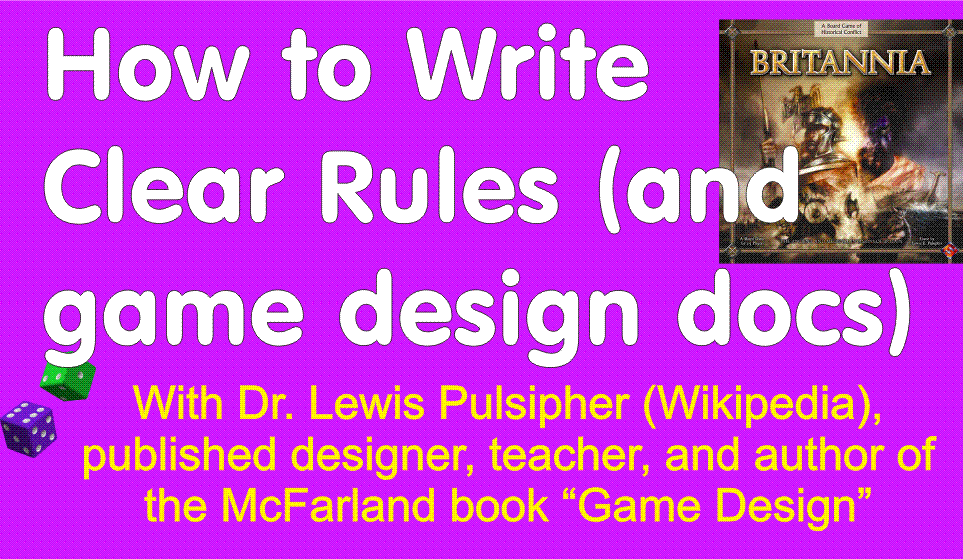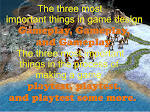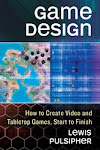Below is the text of the slides. There's much more to the video than that, of course.
Good once, good three times, or always good – what game do you want to make?
Dr. Lewis Pulsipher
Pulsiphergames.com
Robert Heinlein’s Saying
It’s been decades since I read “The Moon is a Harsh Mistress”
But a friend tells me that author Robert Heinlein at one point says this about the nature of jokes: "Funny once, funny twice, or always funny"
Think about it, it’s true (and true of books, as well, if you substitute “worth reading” for “funny”)
And I think it’s become true of games, as well, if we substitute “worth playing” (and I’ll say three, not two)
(We’re ignoring all those jokes, books, games that aren’t worthwhile even once. . .)
How it applies to games
This tends to apply to modern games, both video and tabletop. "Enjoyable once, enjoyable thrice, or enjoyable always."
3500+ tabletop games a year, and tens of thousands of video games (think of all the mobiles (500 per day on iOS) and F2P games)
In both cases, it’s immensely easier to self-publish than in the past
AAA video games have always tended to be “one and done” – “I beat the game” and then I don’t play any more
Because they’re really puzzles more than games
They so often have always-correct solutions (like puzzles)
“Cult of the New”
But tabletop games are leaning the same way, not “I beat the game” (though there is that) but the “Cult of the New”
So most games are played just a few times before everyone moves on to the next
This is exacerbated as there are more and more new games
I think we’ve come to the point that most games are designed to meet this standard of “play three times” (or less)
Need for Personal Validation
So why don’t more people “call out” those weak games?
Heavily-hyped games (e.g. on Kickstarter) build up a “credit”
Young people, especially, feel that they need others to validate their likes, so that they campaign in favor of what they like (and against what they don't, or against anyone who doesn't like what they like). Hence the hype increases
Emotional Investment
Older generations tend to have more belief in their own preferences, and don't feel a need to campaign for them or against the contrary
A result: there is less actual analysis of games and more emotional “us and them”
Magnified by the Internet, of course
Those who let themselves be sold on a game before it’s released, are emotionally invested in the success of the game, so they’re less likely to criticize it once it’s on the market
That’s sad . . .
As long as there are enough buyers for “enjoyable once” or “enjoyable thrice”, it will continue
It’s easier to design games that way, too. You can forget about gameplay depth, and about replayability
You can design the game to be “transparent”, that is, people can figure out how to play well after playing once
No, this is not how deep games used to be designed, it’s “party and family” game design
But that’s where the market is
How many people do you know that study individual games in order to play better? Not many, I’ll bet
Heck, most people don’t even want to read the rules these days
Not surprising that the overall quality of games for “serious” players is decreasing
But that’s where the market is nowadays, short, simple, easy-to-digest games, bagatelles for the most part that we can play a few times and give up
Much easier to design such games, as well
Time-killers
More and more players treat games as time-killers
As long as the individual game isn't too long
What "too long" is varies, but I was recently at a game designer guild meeting where I described an hour-long game as a "filler", and was told fillers are now 15-20 minutes
Not surprising that so many games are shallow, lacking substance
What standard are you working toward as a designer?
***
@lewpuls on twitter
Online courses (with discounts) listed at pulsiphergames.com










